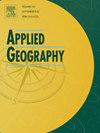Delineating and refining the equity of revealed accessibility of express service amenities: A case study of Guangzhou
IF 5.4
2区 地球科学
Q1 GEOGRAPHY
引用次数: 0
Abstract
Express service amenities are essential for efficient last-mile logistics in urban areas. However, limited data availability has hindered thorough quantitative assessments of equity in revealed accessibility, restricting targeted improvements in amenities planning. To address this issue, this study applies an enhanced two-step floating catchment area (2SFCA) method, combined with genetic algorithms and random forest models, to evaluate and optimize equity in revealed accessibility. Using Guangzhou as a case study, results show notable spatial inequality, with a Gini coefficient of 0.943. The proposed optimization reduces this by 17.8 %, lowering the coefficient to 0.775. This research links market-driven logistics planning with spatial justice, contributing to applied geography and supporting SDG 11 goals. The findings provide practical guidance for urban planners aiming to improve both equity and efficiency in service provision, especially in rapidly urbanizing regions.
快递服务设施可达性公平性的界定与细化——以广州市为例
快递服务设施对于城市地区高效的最后一英里物流至关重要。然而,有限的数据可用性阻碍了对揭示的可达性公平的彻底定量评估,限制了设施规划的有针对性的改进。为了解决这一问题,本研究采用一种增强的两步浮动集水区(2SFCA)方法,结合遗传算法和随机森林模型对揭示可达性公平性进行评价和优化。以广州市为例,研究结果表明,城市空间差异显著,基尼系数为0.943。所提出的优化将该系数降低了17.8%,降低到0.775。该研究将市场驱动的物流规划与空间正义联系起来,有助于应用地理学并支持可持续发展目标11的目标。研究结果为旨在提高服务提供的公平性和效率的城市规划者提供了实际指导,特别是在快速城市化地区。
本文章由计算机程序翻译,如有差异,请以英文原文为准。
求助全文
约1分钟内获得全文
求助全文
来源期刊

Applied Geography
GEOGRAPHY-
CiteScore
8.00
自引率
2.00%
发文量
134
期刊介绍:
Applied Geography is a journal devoted to the publication of research which utilizes geographic approaches (human, physical, nature-society and GIScience) to resolve human problems that have a spatial dimension. These problems may be related to the assessment, management and allocation of the world physical and/or human resources. The underlying rationale of the journal is that only through a clear understanding of the relevant societal, physical, and coupled natural-humans systems can we resolve such problems. Papers are invited on any theme involving the application of geographical theory and methodology in the resolution of human problems.
 求助内容:
求助内容: 应助结果提醒方式:
应助结果提醒方式:


